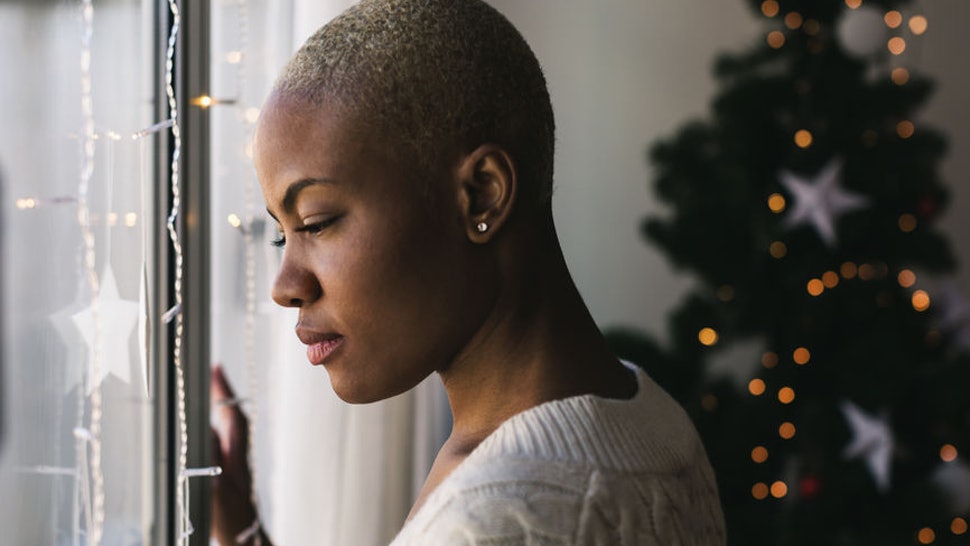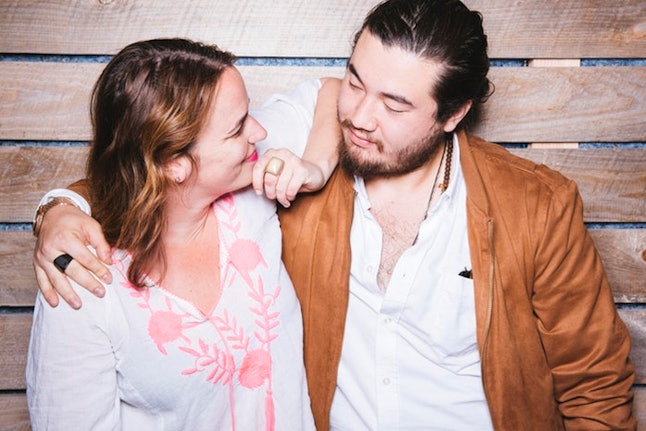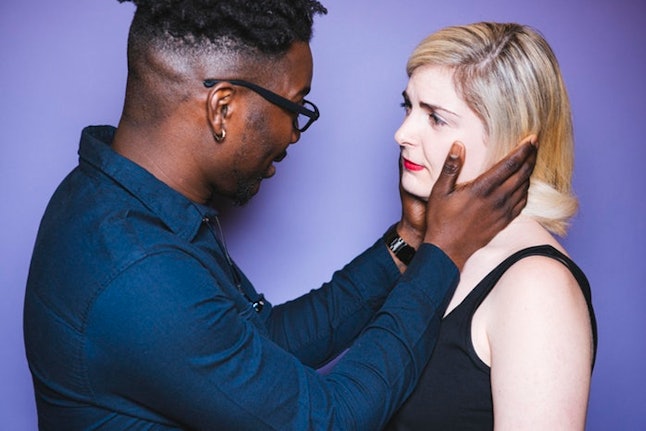
Holiday cheer is in much of the air these days, but it’s not a happy time of year for everyone, especially if certain loved ones are no longer in your life, such as parents, grandparents, or an ex. So, when it comes to coping with grief during the holidays, the way you do so may differ from how somebody else does.
Mary Potter Kenyon, certified grief counselor and author of Refined by Fire: A Journey of Grief and Grace, experienced several losses in a row. “I lost my mother on my 51st birthday in November 2010, my husband in 2012, and an eight-year-old grandson in 2013,” she tells Bustle. “The last thing I wanted to think about was the ho-ho-ho joyful holidays.” She recommends doing whatever it takes to get through the holidays, especially the first ones.
“If it means doing everything the same, or everything differently, find what works for you,” she says. “I know a widower who hired someone to do everything his wife had done that first year, yet I had to do things differently.”
If you’re not sure how to handle grief, it may come down to trial and error. Below, Kenyon and other grief experts weigh in on how to cope with grief, especially around the holidays.
1. Give Yourself Time And Space To Process Your Emotions

Hannah Burton/Bustle
After a loss, you may wish you’d feel better immediately, but it’ll likely take time, and that’s OK. “If you’ve just suffered a loss, the holidays can be tough,” Emily Cosgrove, licensed marriage and family therapist and life coach, tells Bustle. “Give yourself time and space to process your emotions.” She says that it’s OK to not feel OK, and that it’s also OK to feel lonely, grieve, or miss the person. “Be patient, kind, and gentle with yourself as you let yourself hold these emotions,” she says.
2. Find Time To Be Alone

ibpstock/Shutterstock
Justine Haemmerli founded Girls Gone Happy self-help tools, which includes a Loss Deck to help people process grief and its complexities in private or in a group. She tells Bustle that, when you’re grieving, it’s important to find time to be alone. “The holidays can be overwhelming for even the most supercharged extrovert; go for a walk, step outside, leave a party early, take bathroom breaks throughout the night — whatever helps you recharge your batteries, do it,” she says.
Kim Libertini, who co-created the Goodgrief app with Robynne Boyd, which enables you to get in touch with someone else who’s grieving, tells Bustle that she spends some holidays alone to reflect. “Memories can be tough to recall in front of others, so I’ll have my morning coffee at the beach by my house and use this time to reflect on where I’ve been and how far I’ve come,” she says. “These moments by myself are a time to let out my emotions and help keep me together in front of my children.”
3. Have An Escape Plan When You Attend Events If They May Be A Trigger

Hannah Burton/Bustle
Kenyon says that you may think you’ll be fine going to an event, like a holiday family gathering, but then you’ll get there and it’s a whole other story. “Sometimes, you don’t know how you’ll react until you get there,” she says. “Be ready for a quick get-away and have an escape plan.” She says, if not, you may leave something behind, such as your purse.
“I bolted out of a family get-together because it was just too hard, but left my purse behind,” she says. “I couldn’t leave because my keys were in the building, so I stood out in the snow and cried until one of my children found me.”
4. Don’t Be Afraid To Say No To Party Invitations

Ashley Batz/Bustle
On the other hand, Kenyon says it’s OK to skip events altogether if you think they may do more emotional harm than good. “Don’t be afraid to say no to party invitations if you don’t think you can stand to attend parties, especially that first year,” she says. “I had a hard time going places where everyone was paired up and I still do, nearly seven years later.”
Libertini says that, some holidays, she just treats them as a regular day. “If I am alone for the holiday, I pretend it is a regular day and make a list of tasks that I need to get done,” she says. “And if I wake up and the holiday seems too daunting, or I’m without my children for the day, I give myself the OK to make it a day to watch a Netflix series in bed.”
5. Honor Their Holiday Traditions

Andrew Zaeh for Bustle
Like Kenyon says above, some people prefer to keep a loved one’s memory alive by honoring holiday traditions the same way as they did before. Susan Youngsteadt, a family-centered treatment therapist, does this.
“I became an orphan at the age of 25; I lost my mother when I was 17 and my father passed away last year,” she tells Bustle. “To cope with grief over the holidays, I find joy in honoring and continuing traditions.” She says that her father collected nutcrackers, so now she decorates her small apartment with as many nutcrackers and inherited Christmas decorations as she can fit.
“I will sit in my living room with the Christmas tree lit and holiday music playing, and reminisce on the memories of my parents and me during the holidays,” Youngsteadt says.
Libertini, too, shares memories as a grief coping mechanism. “I tell stories to my children about holiday cooking with my mom,” she says. “These are warm memories that I cherish, and it feels good to share a piece of who my mom was with my sons.”
6. Try New Holiday Traditions

Andrew Zaeh for Bustle
You probably had certain holiday traditions with the person you’ve lost, and although you may want to continue doing them, it may be too painful. So, you may want to try something else. “Think about what new traditions you’d like to create or ones that you haven’t done in a while,” Cosgrove says.
Haemmerli agrees. “At first, there was this pressure I felt to memorialize my parents and bring back traditions we had shared, such as make my mother’s favorite dish, listen to the Johnny Mathis CD we played every Christmas of my childhood, and share memories with everyone,” she says. “But when I tried to do these things, they just hurt too much; instead, I focused on just getting through the holidays feeling OK, doing whatever I needed to do to make it through to the other side intact.” She said that some years, this meant sneaking off for drunken karaoke with friends, walking her dogs alone (a lot), or immersing herself in someone else’s traditions.
Kenyon and her family also started new holiday traditions. “Christmas without my grandson was unimaginable, until his younger sibling came up with the idea of giving terrible gifts that year when he spotted a hideous rubber baby at a thrift store and asked if they could give it to their Uncle Dan,” she says. “When my daughter asked if I wanted to participate in the ‘most awful gift-giving scheme,’ it was the first time I saw her smile after her son died, so of course I said yes, and there were more than a few giggles and laughs when we unwrapped our awful gifts.”
7. Leave Town Altogether

Andrew Zaeh for Bustle
Libertini says that one thing she does is book a last-minute travel deal, such as to the Dominican Republic or a city in Europe that’s on her bucket list. “A little sunshine or busy travel helps keep my spirits up, helps me to step away from the loneliness of home, and gives me something to focus my energy on,” she says.
8. Connect With Others

Andrew Zaeh for Bustle
Although you may want to be alone to process your emotions, it’s also good to connect with others, particularly others who understand what you’re going through. “What helps me cope is my ability to openly discuss and remember the people who are missing, while at the same time making the holidays my own,” Heather Stang, grief expert and author of Mindfulness & Grief, tells Bustle.
Youngsteadt agrees. “Having a support system who can shoulder you during the moments and days of grief in the holiday season is vital,” she tells Bustle.
Similarly, Robynne Boyd, co-creator of the Goodgrief app, tells Bustle that she uses the buddy system. “If I’m going to see family or friends, I always make sure I have someone I can count on for emotional and even physical support,” she says.
9. Focus On Activities That Fulfill You

Hannah Burton/Bustle
Rosalind Sedacca, divorce and parenting coach and founder of the Child-Centered Divorce Network, tells Bustle that while you’re grieving, it’s important to focus on activities that will fulfill you.
“This can become an ideal time to reflect on meeting your own needs and finding new people, activities, and events that bring joy into your life,” she says. She adds that this can mean anything from volunteering at a toy or food distribution drive, hospital, or animal shelter.
Libertini agrees and says that submerging herself in workouts is one of the best escapes from the emotions of grief. “I wake up at 4:30 a.m. to get to Orangetheory Fitness class by 5 a.m. every day to grab a daily dose of endorphins,” she says.
10. Remember The Happy Times

Andrew Zaeh for Bustle
While you’re in the thick of grief, it’s easy to think of the sadness more than the happy memories, but doing the latter will help lessen the grief as time goes on.
“The holidays are particularly challenging for people who have had a loved one die,” Stang says. “Finding ways to remember them, rather than suppressing the pain, actually winds up creating more balance, and it allows space for laughter and joy even in the midst of grief.”
Cosgrove agrees. “Honor memories you have of your loved ones and what made your time together special,” she says.
11. Be Better, Not Bitter

Andrew Zaeh for Bustle
Sheryl Hill, executive director and founder of Depart Smart, which focuses on travel safety, tells Bustle that her 16-year-old-son died in a preventable death on a student trip to Japan. “Kids die more often studying abroad than in car wrecks,” she says. To honor her son, she says she and her family do so with how they live their lives, and they remember him always.
Hill also wrote a book, Walking on Sunshine, about living after losing someone. “Be better, not bitter: Do things differently; light candles; say their names; … and hug each other,” she says. “Love is forever.”
12. Seek Out Professional Help & Grief Resources

Ashley Batz/Bustle
While you may feel better when you talk to other friends and family members who are also grieving, it sometimes helps to talk to an outside party, like a grief support group or grief counselor, too.
“Don’t feel embarrassed or afraid to let others know you are feeling lonely, depressed, or sad,” Sedacca says. “Be proactive in seeking out a counselor who can provide advice and new resources for creating alternative holiday traditions and help lift your spirits.”
Heidi McBain, licensed marriage and family therapist and author of Life Transitions: Personal Stories of Hope Through Life’s Most Difficult Challenges and Changes, lost her father two years ago, and right before the holidays. She also recommends talking to someone about how you’re feeling. “Try to sit with the hard feelings when they come up instead of stuffing them down,” she tells Bustle. “A grief counselor can be helpful and supportive during this hard time.”
Rachel Reichblum, too, tells Bustle that using grief resources is an important part of healing, and she created her own resource, as well. “After losing my both of my parents to brain cancer in the last two years (when I was 26 and 28 years old), I started a grief-themed Instagram account chronicling quotes that have resonated with me,” she says. “I’m just trying to provide content for others in this terrible club so we feel less alone, and to provide resources to the friends and extended family who want to help, but really just don’t know where to start.”
13. Do Random Acts Of Kindness

Andrew Zaeh for Bustle
You may hear of people paying it forward, and once you start doing it, you’ll start to feel better overall. “Find ways to do things in honor of the person you loved,” Kenyon says. “I still carry around random acts of kindness cards with my deceased grandson’s name and story on them.” She says she likes to do random acts of kindness in his memory, leaving the card behind. “It helps me if I can do things for other people,” she says.
14. Practice Self-Care, Like Getting Plenty Of Rest

Ashley Batz/Bustle
Self-care is so important day-to-day, but especially when you’re grieving. “Grief is exhausting, so make sure to get plenty of rest,” Kenyon says. “If you can, take naps. I took so many naps that first winter after a loss that I scared myself and my children.”
Cosgrove agrees. “Take care of yourself daily, but especially during holidays or times of high stress,” she says. She says it will help reduce overwhelm, stress, and burnout, as well as help you heal and renew yourself.
“Sometimes, being submerged in everything ‘holiday’ is just too much, so I try to step away and escape and read a book,” Libertini says. “Or, I schedule pampering with a mani/pedi, massage, or a new haircut.”
Stang, too, says she makes sure to use her usual coping skills to help with her grief — meditation, writing, and walking.
15. Remind Yourself That You *Will* Feel Better As Time Goes On

Ashley Batz/Bustle
Cosgrove says that an important thing to remember is that grief is a season in your life. “Be patient — things will get better and you will heal with time,” she says. “Be kind to yourself: Don’t judge yourself or get angry for feeling how you feel.”
Haemmerli, too, says although it will never feel exactly as it did before your loss, you will enjoy yourself again. “Sometimes, the hardest part of grief is feeling that it is endless, and that the very things that were the greatest source of joy now have become the deepest reminder of sadness and loss,” she says. “Remember that this isn’t a forever place. If this holiday is brutal — if you are sad, angry, lonely, despondent — know that you won’t always feel this way; you really, truly, won’t.”
As you can see, there’s no wrong way to do grief, particularly around the holidays. You have to do what grief coping mechanisms work best for you, and that’s the best gift you can give yourself, holidays or not.









